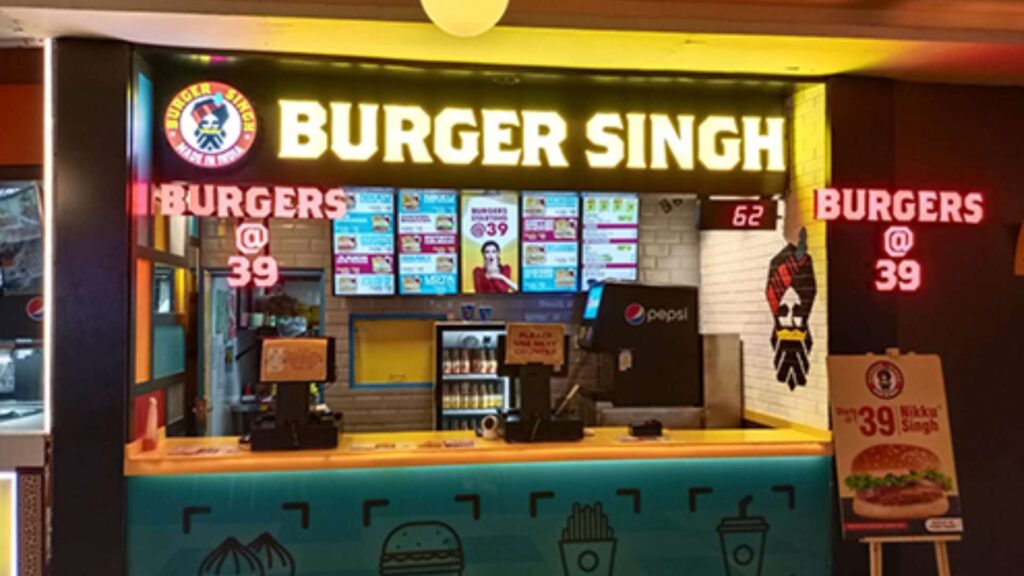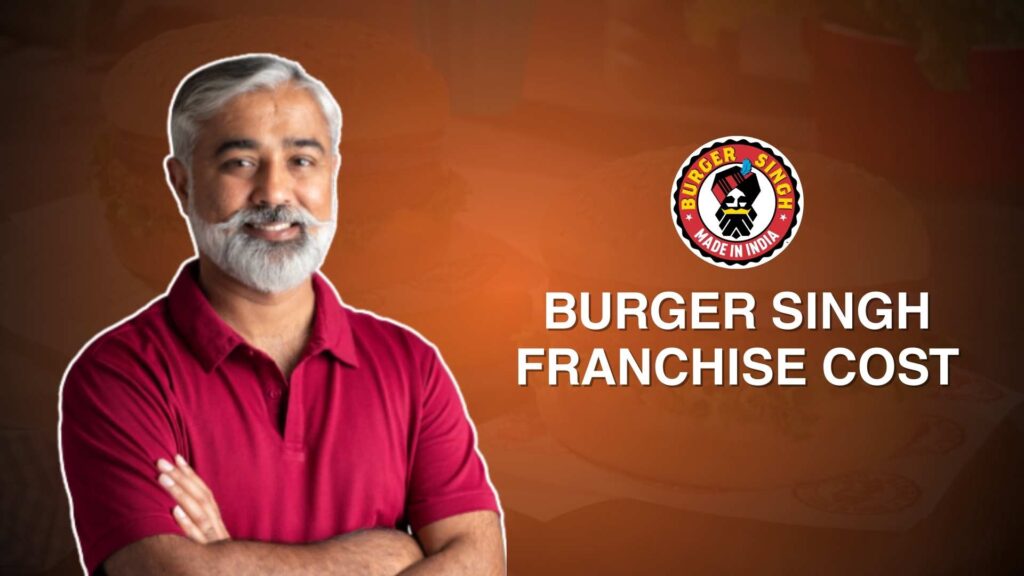By 2025, growth of the Quick Service Restaurant sector in India had witnessed tremendous growth, and burgers appeared to be one of the strongest contributors to this growth. By April 2025, the Indian QSR market stood at ₹26,800 crores ($3.5 billion USD) and is expected to reach ₹82,500 crores ($11 billion USD) by 2030, indicating a CAGR of 18.7%. This growth pattern has placed India amongst the fastest-growing food service markets worldwide, contributing to 2.3% of national GDP.
In this flourishing environment, homegrown brands like Burger Singh have acquired considerable market share by offering Indian flavors at attractive prices. For the aspiring entrepreneurs contemplating entry into the prospering sector, it is imperative that they understand the Burger Singh franchise cost structure and business model in laying down the assessment of this investment opportunity.
About the Brand

Founded in 2014, Burger Singh is fast revolutionizing the face of India’s quick-service restaurant (QSR) industry by putting into practice the concept of Indian-styled burgers. Within a very short time, the brand has added to the 1 Gurgaon outlet from where it has now grown to over 180 outlets in 60 cities in India by the end of 2025. Amritsari Murgh Makhani Burger and Chana Burger are some of the favorite dishes that have become synonymous with Burger Singh in bringing the Western-style fast-food concept together with authentic Indian flavors and spices.
For the new fiscal year of 2024-25, the company is reportedly doing as much as 142 percent revenue increment compared to the last financial year’s figures, proof of their remarkable endurance and growth even during trying economic times. Not only has this brand managed to find itself easily into a mission to have 500 outlets by 2028, but it is also on its way to being the largest growing burger chain in India, making the Burger Singh franchise cost truly worth-the-invest consideration.
USP
- Indianized Menu: Unique proposition brand offers: no other in the world has burgers that have been Indianized; they are truly relished spices and authentic flavorings and devoted to the Indian taste buds.
- Scalable Business Model: Burger Singh has made flexible formats of store size: Flagship, Express, and Kiosk. The different sizes fit different locations and investment capacities, also with the different franchise cost.
- Technology Integration: This software aiding the Company for its unique modules to manage inventories, sales, and customers ensures that all the franchise outlets can work effectively.
- Low Setup and Operational Costs: Compared to their rival international burger chains, adding their initial investment by 38% and their operational costs by 25%, they would present a more affordable franchise cost for the massive Burger Singh chain.
- Possess Strong Supply Chain Management software: It has made a strong pan-India supply network within the brand that assures each franchise would get the proprietary components for its various product categories in the same quality and timing.
- Brand Recognition: That’s the value that Burger Singh has built up: strong customer loyalty and an established place in the market into which all its franchises are ushered. 4.8 million social media followers, of course, helps in that.
Why Invest in the Burger Singh Franchise?
- Geometric Growth Path: Since the year 2020, Burger Singh has shown positive growth with regards to store location openings shown to be at 73 percent every year, an average same-store sales growth of about 28 percent on an annual basis whereas the industry average stands at only 12 percent.
- Conducive Return on Investment: Franchisees report returns on returns after between 18 and 24 months, with average per-store monthly revenues of ₹12-15 lakhs and net profit margins between 18-22%, making the Burger Singh franchise cost an investment rapidly recoverable.
- Business Model: The brand grew 31% even during the pandemic years, proving recession resistant and adaptable to changing market conditions.
- Untapped Market Potential: A great area of opportunity still remains for early franchisees in this investment, as QSR penetration in Tier 2 and Tier 3 cities of India remains only 12%, versus 37% in the metro cities.
- Multiple Revenue Provenance: Apart from dine-in services, franchisees also enjoy the delivery partnerships (42% of revenue), the catering service (8% of revenue), and exclusive merchandise sales (5% of revenue) of the business.
- Competitive Edge: With a share of 32% in the market for “Indian flavored burgers,” Burger Singh is at 87% repeat rate among its customers, while franchisees enjoy unique competitive advantages in the highly crowded QSR segment.
The Cost of a Burger Singh Franchise in India
The first thing that prospective investors looking into this opportunity will subscribe to is obviously understanding the Burger Singh franchise cost . The investment required can vary on numerous factors like location, store format, and regional market conditions. Hence, here is a total break-up of the complete financial commitment one would have to incur in order to own and operate a Burger Singh franchise in India, in 2025.
Cost Breakdown
Franchise Fee
Burger Singh’s initial franchise fee costs anywhere between ₹12 lakhs-15 lakhs, depending upon the tier of the city and the exclusivity of the location. This one-time fee grants you:
- The use of the name and trademarks of Burger Singh,
- Access to proprietary recipes and methods,
- Training of management and other staff,
- Pre-launch marketing support worth about ₹2 lakhs,
- Protection of the territory for a limited area.
Under the usual conditions, the franchise will be in force for five years and can then be renewed for an extra five years with a payment equating to 50% of the then-current franchise fee for Burger Singh.
Initial Investment
This initial payment provides you with access to the Burger Singh brand rights, training, and ongoing support, ensuring you can operate under their established brand framework.
Beyond the franchise fee, the total initial investment for establishing a Burger Singh outlet varies by format:
| Outlet Type | Total Franchise Cost | Interior Fit-out & Equipment | Technology Systems | Initial Inventory | Permits & Licenses | Security Deposit |
| Flagship Store | ₹45-55 Lakhs | ₹28-32 Lakhs | ₹3-4 Lakhs | ₹2-3 Lakhs | ₹1-1.5 Lakhs | ₹3-5 Lakhs |
| Standard Outlet | ₹35-45 Lakhs | ₹22-26 Lakhs | ₹2.5-3.5 Lakhs | ₹1.5-2.5 Lakhs | ₹1-1.5 Lakhs | ₹2-4 Lakhs |
| Express Outlet | ₹25-35 Lakhs | ₹16-22 Lakhs | ₹2-3 Lakhs | ₹1-2 Lakhs | ₹0.8-1.2 Lakhs | ₹1.5-3 Lakhs |
| Food Court Kiosk | ₹18-25 Lakhs | ₹12-16 Lakhs | ₹1.5-2.5 Lakhs | ₹0.8-1.5 Lakhs | ₹0.5-1 Lakhs | ₹1-2 Lakhs |
Ongoing Costs
The following expenses are to be taken into account once you have established your Burger Singh franchise cost:
- License Fee: 5% of net monthly sales
- Contribution to Marketing: 2% of net monthly sales for national marketing collateral
- Technology Subscription: ₹8,000-12,000 for point-of-sale (POS) systems, app integration, and software maintenance monthly
- Inventory Costs: Cosmetics costs in the range of 30-35% of sales revenue
- Labour Costs: 12-15% of sales revenue, including direct salary, employee training, and employee benefits
- Utilities and rent: About 8-12% of sales for utilities and 15-20% for rent (depending upon the site)
- Maintenance Reserve: 3% of sales is suggested for maintaining or replacing equipment
This incurs 68-75% in operational costs, thus leaving the franchisees with 25-32% in profit margins before taxes, which positions the Burger Singh franchise price as a very convincing investment generating lucrative returns.
Profitability & ROI: The Potential for Success
Potential for Profitability
The expenses of the Burger Singh franchise have to be considered relative to its profit potential. Considering the current performance parameters across its franchise network:
- Average revenue per outlet in the range of 12 to 15 lakhs monthly.
- Gross profit margins ranging from 65% to 68%.
- Net profit margins after all expenditures including royalty ranging from 18% to 22%.
- Average monthly net profit is between ₹2.16 lakh to ₹3.3 lakh
With profitability usually being in this order:
- First three months-break even or insignificant profit.
- Months four to six-eight to twelve percent profit.
- Months seven to twelve-fifteen to eighteen percent profit.
- After the first year returns will be at maximum of eighteen to twenty-two percent profit margin.
Market Demand
The market fundamentals supporting the Burger Singh franchise cost investment include:
- Foodservice sector in India is growing at a CAGR of 18.7%.
- It has been noted that the burger segment is experiencing growth at a rate of 26.3% annually.
- Only 32% of the overall burger market is captured by branded chains of burgers, which shows great potential for further growth.
- The current statistic indicates that 78% of Indian consumers prefer brands that serve Indian-inspired international cuisine.
- The online food delivery penetration rate had also increased up to 35% by 2025 from 10% in 2020.
- The target customer group for Burger Singh consists of 68% of the target group of 18-35 years old, eating out or ordering in at least 4 times a week.
Factors Influencing ROI
Numerous factors influence the return timeline on the Burger Singh franchise price:
- Location Quality: Highest rents would usually have average locations generating 40-60% more revenue than premium locations.
- Efficiency: The best performing franchises in this affiliation operate at food cost levels of 28-30%, when the average is 32-35%-in that way showing one of the best operating efficiencies.
- Multiple-Outlets: This business model brings in savings of 8-12% per outlet from shared overhead costs.
- Local Promotional Capability: Franchisees that invest an additional 3% in local marketing for example see 22% better sales.
- Delivery Integration: Outlets with optimized delivery operations generate 35-42% of turnover through this channel.
Depending on the performance available, the franchisees can expect:
- Complete return of investment in Burgers Singh franchise cost in 18-24 months.
- Average annual return on investment after the second year of operation is 40-55%.
- Cumulative five-year return on investment of 250-300% on the original investment.
Eligibility Criteria
- Finances: Proof of liquid capital of at least 50% of the total franchise cost (₹9-28 lakhs depending on format). An applicant’s net worth should be at least 1.5 times the total investment amount.
- Property: Should have access to a commercial space located in a high-traffic area and conforming to the format specifications (250-1200+ sq. ft.), with minimum 15′ frontage for a regular outlet and good ventilation facilities.
- Business Experience: Previous experience in food service, retail management, or business ownership is preferred but not mandatory, with 65% of successful franchisees having had experience in their own business in some form.
- Long Active Franchise Ownership: Franchisees must work on-site for a minimum of six months after opening, with a plan in writing for transfer of responsibilities to other managers should they wish to go on to semi-passive franchise ownership.
- Multi-Unit Development Potential: For prime territories, preference will be given to candidates able and interested in developing multiple units within 3-5 years with subsequent outlets enjoying a reduced Burger Singh franchise cost.
- Cultural Fit: Candidates need to demonstrate that they fit in with Berger Singh’s brand values and customer services philosophy. All applicants will go through a proprietary “culture fit” assessment as part of the selection process.
How to Apply for Burger Singh Franchise
- Deep Initial Enquiry: Enroll an official application at the Burger Singh portal (franchise.burgersingh.in), submitting personal details, financial papers and preferred territories, and the relevant business experience.
- Preliminary Bibliography Entry: Qualified applications appeared at the initial screening call scheduled in 7-10 business days with the franchise development teams to know about the investment potential, location interests, while clarifying the cost structure of the Burger Singh franchise.
- Comprehensive Discovery: The selected candidates will then participate in a complete discovery session concerning the business model, support systems, and financial projects and later visit any of the existing outlets.
- Due Diligence Phase: The candidates will get the Franchise Disclosure Document (FDD) which mentions everything concerning the costs that comprise the franchise accusation and business relationship, alongside 21 days for reading and third-party consultation.
- Location Analysis: The Burger Singh real estate team does a market assessment of the prospective sites, using factors such as the footfall catchment demographics and the competition to ascertain viability.
- Final Approval: The candidates go ahead to sign the franchise agreement, pay the Burger Singh franchise cost franchise fee, and enter the pre-opening development phase after background checks and financial verification.
Support and Training from Burger Singh
To ensure franchisees make the maximum return on their Burger Singh franchise cost investment, the company supports franchisees throughout the entire life cycle of business:
Pre-launch Support
- Site selection and demographic analysis along with footfall studies
- Design and layout planning (valued at ₹1.5-2 lakhs)
- Sourcing of equipment at rates negotiated by the corporation (saving 12-18% on retail prices)
- Construction management and supervision of project timelines
- Recruitment assistance of key staff
- Developing and executing pre-opening marketing campaigns
Initial Training Program
- This comprehensive training program lasts for 21 days at Burger Singh University in Gurgaon
- Practical training in operations regarding food preparation, service standards, along with equipment maintenance
- Management training regarding stock/ inventory control, staff scheduling and financial administration
- Marketing and customer service modules for local customer acquisition
- Technology systems training for POS, inventory, and delivery integration
Ongoing Support
- Operational consultants conduct regular field visits (monthly in the first year and quarterly thereafter).
- 24/7 support for operational troubleshooting
- Quarterly changes in the menu, limited-time offerings, and full implementation guides.
- Analytics on performance benchmarking outlet metrics to regional and national levels
- Negotiated rates with delivery partners and suppliers to maximize profitability
- Annual franchisee convention to foster networking and best practice sharing.
Marketing Support
- National marketing campaigns through the 2% marketing contribution
- In-store marketing kit with customizable templates and strategies
- Social media content calendar and management guidelines
- Store opening and landmark public relations support
- Local seasonal promotion calendars.
Benefits of a Burger Singh Franchise
- Lower Investment Threshold: Compared to international burger chains, selling Burger Singh franchises is 30-40% less expensive, but profit potential is similar or better due to efficient operations and supply chain.
- Rapid Scaling Potential: Successful franchisees earn priority rights to other territories and a fast track of development; 42% of their existing franchisees operate multiple units.
- Proprietary Products: The unique recipes and proprietary spice blends enable distinct competition: 73% of customers say unique flavors are the number one reason why they chose Burger Singh.
- Digital Integration: All outlets are integrated along with the Burger Singh app that has 1.8 million active users and generates 27% of overall sales with in-app customers spending 32% more on an order compared to walk-ins.
- Evolving Menu Strategy: Franchisees will benefit from quarterly menu innovations, based on consumer research from the market, and every new item typically boosts same-store sales by 8-12% within the first month.
- Exit Strategy Options: The growth path of the brand offers several exits for franchisees; existing transfer franchises are valued up to 2.5-3.5 times annual profit in sales, which translates to a considerable appreciation on investment.
Conclusion
The Burger Singh franchise cost represents a strategic investment opportunity located in India’s rapidly growing QSR sector. The initial investment would range from ₹18 to ₹55 lakhs depending on the type of format, and the franchisee enters a stabilized business model with robust unit economics and great support systems. The brand’s unique positioning intertwining Western fast food concepts with Indian flavors creates an excellent market niche with proven consumer loyalty and some impressive growth metrics, making it a strong contender among those seeking the Best Cafe Franchise in India opportunities.
The capital outlay in the Burger Singh franchise would be a very good value from the viewpoint of an entrepreneur looking to enter the food service industry. These possible returns would far exceed those of conventionally acceptable investment modes. Early franchisees have the best chance to reap benefits from this homegrown success story as India’s QSR market continues to grow at a projected rate of 18.7% per year through the year 2030.
FAQs
What is the minimum space for a Burger Singh outlet?
The smallest format (kiosk) has a requirement of 250-350 sq. ft., while the standard outlet takes up 800-1000 sq. ft. Each format has Burger Singh franchise cost structure, which is linked to the space that is needed.
How long does it take for a franchise to open after signing?
It usually takes 90-120 days from signing the franchise agreement to the grand opening, with pre-launch making extensive use of a proprietary project management system.
Does Burger Singh offer any loans for opening a franchise?
Not currently however Burger Singh has tie-ups with certain financial institutions who have given special loan rates for approved franchisees.
What percentage of Burger Singh franchisees are profitable within the first year?
Statistics state that 83% of outlets achieve profitability in 8 months, and 92% are profitable by the 12-month mark if properly followed the operational model.
Can I have a Burger Singh franchise as a passive investor?
Yes, a truly passive investment is allowed but the company highly recommends active involvement in the first six months after which it is possible to move towards a semi-passive investment with the right management.

